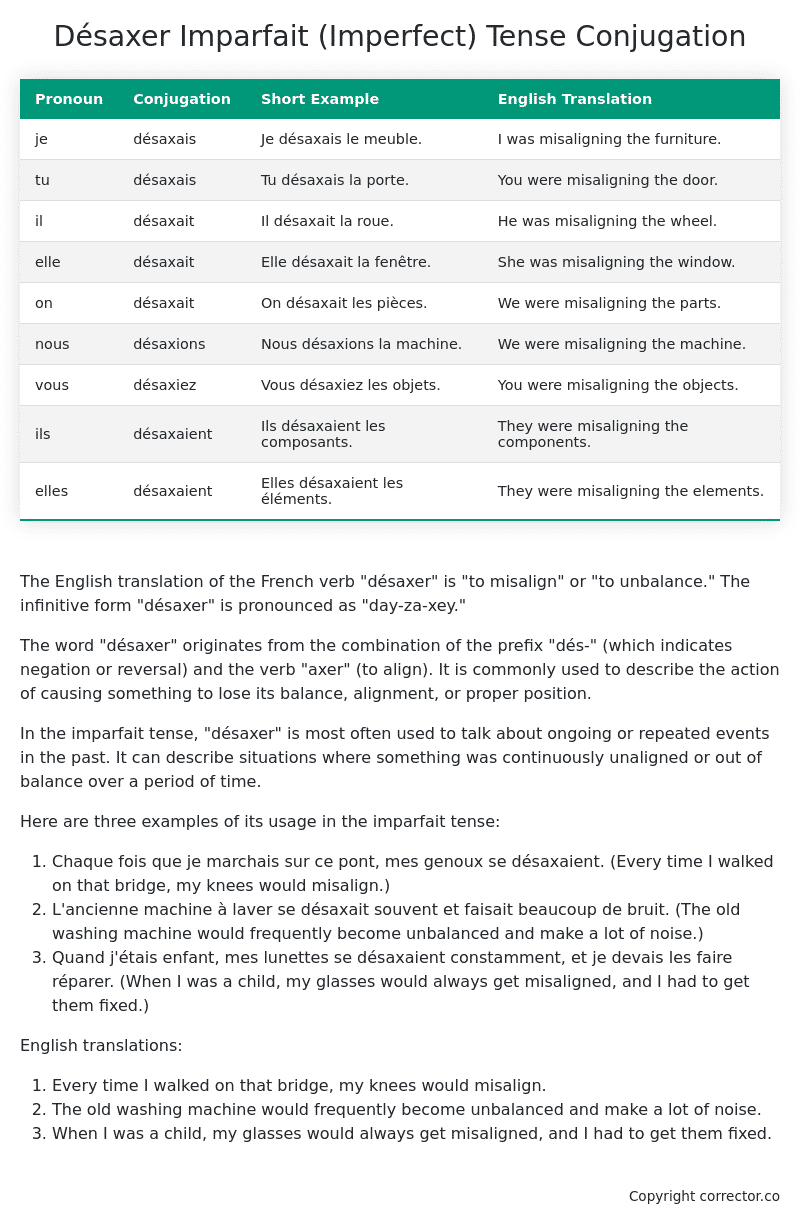Imparfait (Imperfect) Tense Conjugation of the French Verb désaxer
Introduction to the verb désaxer
The English translation of the French verb “désaxer” is “to misalign” or “to unbalance.” The infinitive form “désaxer” is pronounced as “day-za-xey.”
The word “désaxer” originates from the combination of the prefix “dés-” (which indicates negation or reversal) and the verb “axer” (to align). It is commonly used to describe the action of causing something to lose its balance, alignment, or proper position.
In the imparfait tense, “désaxer” is most often used to talk about ongoing or repeated events in the past. It can describe situations where something was continuously unaligned or out of balance over a period of time.
Here are three examples of its usage in the imparfait tense:
- Chaque fois que je marchais sur ce pont, mes genoux se désaxaient. (Every time I walked on that bridge, my knees would misalign.)
- L’ancienne machine à laver se désaxait souvent et faisait beaucoup de bruit. (The old washing machine would frequently become unbalanced and make a lot of noise.)
- Quand j’étais enfant, mes lunettes se désaxaient constamment, et je devais les faire réparer. (When I was a child, my glasses would always get misaligned, and I had to get them fixed.)
English translations:
- Every time I walked on that bridge, my knees would misalign.
- The old washing machine would frequently become unbalanced and make a lot of noise.
- When I was a child, my glasses would always get misaligned, and I had to get them fixed.
Table of the Imparfait (Imperfect) Tense Conjugation of désaxer
| Pronoun | Conjugation | Short Example | English Translation |
|---|---|---|---|
| je | désaxais | Je désaxais le meuble. | I was misaligning the furniture. |
| tu | désaxais | Tu désaxais la porte. | You were misaligning the door. |
| il | désaxait | Il désaxait la roue. | He was misaligning the wheel. |
| elle | désaxait | Elle désaxait la fenêtre. | She was misaligning the window. |
| on | désaxait | On désaxait les pièces. | We were misaligning the parts. |
| nous | désaxions | Nous désaxions la machine. | We were misaligning the machine. |
| vous | désaxiez | Vous désaxiez les objets. | You were misaligning the objects. |
| ils | désaxaient | Ils désaxaient les composants. | They were misaligning the components. |
| elles | désaxaient | Elles désaxaient les éléments. | They were misaligning the elements. |
Other Conjugations for Désaxer.
Le Present (Present Tense) Conjugation of the French Verb désaxer
Imparfait (Imperfect) Tense Conjugation of the French Verb désaxer (You’re reading it right now!)
Passé Simple (Simple Past) Tense Conjugation of the French Verb désaxer
Passé Composé (Present Perfect) Tense Conjugation of the French Verb désaxer
Futur Simple (Simple Future) Tense Conjugation of the French Verb désaxer
Futur Proche (Near Future) Tense Conjugation of the French Verb désaxer
Plus-que-parfait (Pluperfect) Tense Conjugation of the French Verb désaxer
Passé Antérieur (Past Anterior) Tense Conjugation of the French Verb désaxer
Futur Antérieur (Future Anterior) Tense Conjugation of the French Verb désaxer
Subjonctif Présent (Subjunctive Present) Tense Conjugation of the French Verb désaxer
Subjonctif Passé (Subjunctive Past) Tense Conjugation of the French Verb désaxer
Subjonctif Imparfait (Subjunctive Imperfect) Tense Conjugation of the French Verb désaxer
Subjonctif Plus-que-parfait (Subjunctive Pluperfect) Tense Conjugation of the French Verb désaxer
Conditionnel Présent (Conditional Present) Tense Conjugation of the French Verb désaxer
Conditionnel Passé (Conditional Past) Tense Conjugation of the French Verb désaxer
Conditionnel Passé II (Conditional Past II) Tense Conjugation of the French Verb désaxer
L’impératif Présent (Imperative Present) Tense Conjugation of the French Verb désaxer
L’impératif Passé (Imperative Past) Tense Conjugation of the French Verb désaxer
L’infinitif Présent (Infinitive Present) Tense Conjugation of the French Verb désaxer
L’infinitif Passé (Infinitive Past) Tense Conjugation of the French Verb désaxer
Le Participe Présent (Present Participle) Tense Conjugation of the French Verb désaxer
Le Participe Passé (Past Participle) Tense Conjugation of the French Verb désaxer
Struggling with French verbs or the language in general? Why not use our free French Grammar Checker – no registration required!
Get a FREE Download Study Sheet of this Conjugation 🔥
Simply right click the image below, click “save image” and get your free reference for the désaxer imparfait tense conjugation!

Désaxer – About the French Imparfait Tense
NOTE: To take a deep dive into all the French tenses then see our article on Mastering French Tense Conjugation.
Formation of the Imparfait Tense
For regular -er verbs:
For regular -ir verbs
For regular -re verbs
Common Everyday Usage Patterns
Description of Past Habits
Background Information
Mental and Emotional States
It’s employed to express emotions, thoughts, or physical sensations in the past. For example: “J’étais content quand il est arrivé.” (I was happy when he arrived.)
Ongoing Actions
Points to Note About the Imparfait Tense
Passé Composé vs. Imparfait
Conditional
Si Clauses
Narration
I hope you enjoyed this article on the verb désaxer. Still in a learning mood? Check out another TOTALLY random French verb imparfait conjugation!


